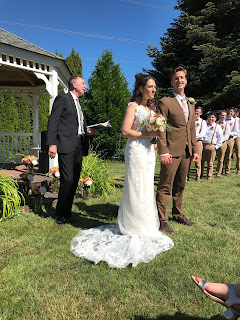While browsing in our retirement center’s library, I recently found a book called A Treasury of Senior Humor, For And About Us Older Folks. I checked it out, ready for a good laugh. But my first reaction as I skimmed through the book was irritation. It seems to reinforce the stereotype of old people as ailing idiots—perpetually complaining and saying stupid stuff. Pathetic. It uses terms like “old codger,” “old maid,” “old goat,” and “over the hill.” The complier and editor. James E. Meyers, refers to himself as an “old coot.” Is this how we want to be known, even in jest? I certainly don’t.
On the other hand, isn’t laughter,
especially about oneself, healthy? If it helps not to take oneself too
seriously, yes. Even so, most of these jokes offend my sense of ongoing life
and purpose.
I actually read through the book,
skimming parts, focusing on the shorter jokes. In spite of my irritation, I
found myself laughing at some of them. In order to justify the time I spent
with this book, I’ll share some of the least offensive jokes with you. I hope
they don’t make you mad.
Here goes:
--There is a standing unstated
rule in small Indiana towns that when two old people over seventy-five get
married, the guests don’t throw rice; they throw vitamin tablets.
--One sure way of breaking a man of the habit of biting his nails is to hide his teeth.
--Then there was Edna Shaker who
had lived all her life in the hills of Arkansas. She lived a good but primitive
life without modern conveniences … until recently. Finally, she got her first
refrigerator and she loved it, along with all the conveniences that electricity
brought to her mountain home But she had one complaint about the refrigerator.
“It ain’t that we’re out of ice,” she said. “George he cuts it every winter and
we pack it in sawdust and it keeps fine, same as always. But with that new “frig’rator,”it
takes me too much time to cut our ice into squares just the right size to fit
all them leetle spaces in the ice trays.”
--I adore my bifocals,
My false teeth fit fine.
My hairpiece fits swell.
But I sure miss my mind.
--It’s been said that you know you are growing older when, in the morning, you stand and hear the usual snap, crackle, pop … and it isn’t breakfast cereal.
--Old Mrs. Peters took her first
plane ride and found that the altitude caused her ears to plug up. She was most
uncomfortable and asked the hostess for relief. The hostess gave her a stick of
gum and asked her to let her know if that helped.
At the end of the flight, the
hostess asked Mrs. Peters if her ears were OK. “Yes. That seemed to help,” Mrs.
Peters replied. “But could you advise me as to the best way of getting that gum
out of my ears, now that we’re on the ground?”
--“Whenever I’m in the dumps, I go
get a new dress,” a matron confided.
“Oh yes. How interesting,
responded her friend. “I was wondering where you got them.”
--A sad thing happened to Joe
Smith, a retired farmer who had moved to Minneapolis. It seemed that he froze
to death. The poor guy went to the drive-in to see “CLOSED FOR THE WINTER.”
--Wife: “When I was young, I could
have married a real caveman.”
--Husband: “When you were
young, that’s all there were.”
--If you get tired of replying to
the question, “To what do you attribute your old age?” You might answer just as
this old man did: “To the fact that I was born a very long time ago.”
“The worse part of growing old,”
said Grandpa Hugh Garvey, father of thirteen, “is that I have to listen to
advice from my children.”
--Age is a matter of mind. If you don’t mind, it doesn’t matter.
--Grandfather Edwards was reading
a magazine, looked up from it to tell his wife, “The derndest story in here,
Mary, where it says this old guy my age with a wooden leg just married a gal
with a cedar chest. Can you imagine what a time they’ll have with splinters!”
--Old age has been defined as that
time in life when you know all the answers but nobody asks you the questions.
--“Grandma, how long have you and
Grandfather been married?” asked the granddaughter.
“Fifty years,” Grandma
replied.
“Isn’t that wonderful,”
exclaimed the granddaughter. “And I’ll bet that in all that time, you never
once thought about a divorce … right?
“Right. Divorce, never …
Murder, sometimes.”
--Be tolerant of those who
disagree with you. After all they have a right to their stupid ridiculous
opinions.
Are you laughing? Or scowling? At
any rate, have a good day.















